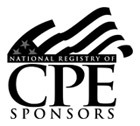
View Details/Register
View Details/Register
View Details/Register
View Details/Register
View Details/Register
View Details/Register
View Details/Register
View Details/Register
View Details/Register
View Details/Register
View Details/Register
View Details/Register
View Details/Register
View Details/Register
View Details/Register
View Details/Register
View Details/Register
View Details/Register
View Details/Register
View Details/Register
View Details/Register
View Details/Register
View Details/Register
View Details/Register



CPA - small firm
CPA - medium firm
CPA - large firm
This course tackles the question: Is it ethical to “manage” the earnings number – that is, to use legitimate discretion in the preparation of the financial statements to manage the numbers in a way that serves the interests of the manager independent of whether it serves the interest of the firm’s owners? We begin by creating an ethical framework based on the professional code of ethics. We then cover the what, why, how, and when of earnings management behavior, describing and illustrating the variety of ways in which managers use their discretion in operating, investing, financing, and reporting decisions to influence the financial reports. In the vast majority of these cases, we rely on real-world examples, taken from publicly-available financial statements that received unqualified audit opinions.
For the various categories of earnings management, we consider how they can be evaluated within the ethical framework we established in the beginning of the course. The result is an informed and thoughtful approach to assessing whether a given earnings management practice is consistent with professional ethics, a valuable tool whether you are an external auditor reviewing a set of statements, a preparer of the statements, or an outsider attempting to determine the usefulness of the statements.
Learning Objectives:
- Describe the major elements of the accounting professional code of ethics
- Define earnings management and link it to the elements of the code of ethics
- Explain why earnings management is practiced
- List and describe the two basic forms of earnings management: real and reporting
- Identify common situations when earnings management is practiced
Self-Study Course Instructions:
FOR DOCUMENT-BASED COURSES
Download the course document(s) (below) and follow prompts contained in the document.
FOR RECORDED COURSES WITH VIDEO
Download any course document(s) (below) which may include handouts, glossary, transcripts, etc. Follow any prompts contained in the documents to help you complete the course. Most documents are searchable.
Play the recording, noting the sectional guides indicating where topics on the agenda are covered and the prompts to pause video playback to respond to a review question (located below the video playback area). The timestamps for review questions are also noted below.
Upon completing the video and successfully answering all review questions, you will then take the final exam.
QUESTION 1: 0:05:45 minutes
QUESTION 2: 1:26:30 minutes
QUESTION 3: 1:39:00 minutes
QUESTION 4: 0:10:15 minutes
QUESTION 5: 0:17:45 minutes
QUESTION 6: 0:19:30 minutes
QUESTION 7: 0:20:21 minutes
QUESTION 8: 0:30:00 minutes
QUESTION 9: 0:45:00 minutes
QUESTION 10: 0:54:38 minutes
QUESTION 11: 1:14:30 minutes
- CPAacademy self-study courses are online.
- The self-study format allows you to a) access the material online 24/7 and b) study at your own pace.
- Per NASBA guidelines, you have one year from date of purchase to complete each program.
- Complete your final exam at any time and get graded instantly. You can retake the exam at no additional charge (unlimited attempts).
- Print your own certificate of completion on the spot upon passing the exam.
- Grading policies: a) courses have a minimum passing score 70% b) test takers will not be provided feedback on failed exams.
- Upon achieving a passing score, test takers will be notified of the correct answers to the questions missed.

Jamie Pratt
PRATTedu
CEO
[email protected]
(812) 322-5153
Jamie Pratt held the Alva L. Prickett Chair of Accounting at the Kelley School of Business at Indiana University in Bloomington, Indiana, for 10 years and in now holds the title of Emeritus faculty. He received his doctorate in business from Indiana University in 1977, and has held faculty positions at the University of Washington (Seattle), the University of Zurich (Switzerland), Northwestern University and INSEAD (Fontainebleau, France), returning to Indiana in 1991.
Jamie’s research interests are in financial reporting and analysis, where he has published over 30 articles in the top academic research journals (including The Accounting Review, Journal of Accounting Research, Contemporary Accounting Research, Accounting, Organizations and Society, and Issues in Accounting Education), and he has taught courses in financial reporting and analysis at every level (introductory, intermediate, advanced) in every program (undergraduate, MBA, PhD). He has received over 30 teaching awards and recognitions, and also taught executive education courses throughout the world. Research and/or teaching recognitions have also come from the following organizations: American Accounting Association, American Taxation Association, Big 4 accounting firms (KPMG and PriceWaterhouseCoopers), Indiana Society of CPAs, the Universities of Manchester (England), Kwansei Gakuin (Japan) and Kentucky, and Business Week magazine. His resume also includes two textbooks (one in its 11th edition), two computer-based interactive case platforms, a financial analysis case book, and several instructor guides that support these products.
He is now CEO of PRATTedu (www.prattedu.com), which produces and delivers online video-based courses, primarily in the area of financial reporting and analysis.


NASBA Approved
CPAacademy.org (Sponsor Id#: 111889) is registered with the National Association of State Boards of Accountancy (NASBA) as a sponsor of continuing professional education on the National Registry of CPE Sponsors. State boards of accountancy have final authority on the acceptance of individual courses for CPE credit. Complaints regarding registered sponsors may be submitted to the National Registry of CPE Sponsors through its website: www.nasbaregistry.org.
CPAacademy.org 1685 S. Colorado Blvd, Suite #205, Denver, CO 80222

